
The crypto market retreated Thursday after a week of strong ETF inflows, as traders awaited Federal Reserve Chair Jerome Powell’s speech for clues on monetary policy amid the U.S. government shutdown.
Bitcoin (BTC) dipped below $121,500, falling past a key support level and the 200-hour simple moving average, according to CoinDesk data. The pullback reversed Wednesday’s gains, dragging other major tokens lower: ETH and BNB each fell more than 3%, while the CoinDesk 20 Index declined 1% to 4,155 points.
The decline came despite continued ETF inflows, with U.S.-listed spot ETFs adding $426 million on Wednesday, extending a streak of strong contributions over the past week, per SoSoValue.
The U.S. dollar strengthened ahead of Powell’s remarks, with the dollar index rising to 99.10 — the highest since August 1 — dampening demand for dollar-denominated assets like Bitcoin and gold. Gold briefly dropped to $4,000 per ounce before bouncing back above $4,030.
Powell Speech in Focus
Powell is scheduled to speak at the Community Bank Conference in Washington at 12:30 GMT. Market participants will look for insights into the Fed’s policy stance, especially given the shutdown has paused key economic releases on inflation and employment.
Fed Minutes Highlight Caution
The Federal Reserve’s September meeting minutes, released Wednesday, showed officials concerned about the shutdown’s impact. “Should the shutdown not end by the FOMC’s Oct. 28-29 meeting, policymakers essentially will be flying blind on key economic metrics,” the committee noted.
Officials generally agreed that additional rate cuts would likely be appropriate, though there was debate over the pace. The FOMC voted 11-1 to cut the federal funds rate by 25 basis points to roughly 4%, with a majority anticipating at least two more cuts this year, potentially bringing rates down to 3.50–3.75%.
Discussions also highlighted a weakening labor market and early inflation signals, though members agreed that Trump’s trade tariffs were unlikely to cause lasting inflationary pressure.






More Stories
Bitcoin slips below $70,000 as crypto selloff intensifies ahead of the U.S. equity open.
Bitcoin rebounds above $71,000 as tech stock selloff eases.
Bhutan shifts bitcoin to trading firms and exchanges as BTC slides toward $70,000.